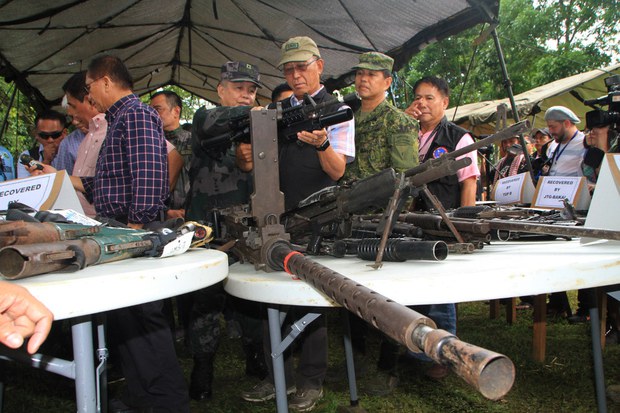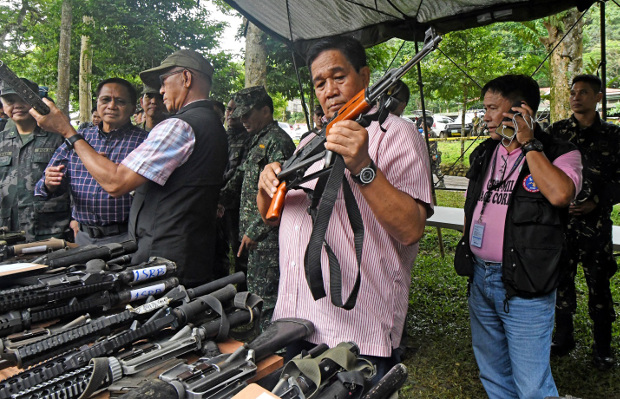Philippines: Humanitarian Workers Call for More Aid for Marawi Evacuees
2017.06.08
Marawi, Philippines
 Philippine Defense Secretary Delfin Lorenzana holds a weapon as he and other officials inspect firearms seized by government forces from Islamic State-linked militants in Marawi, during a visit to the southern city, June 8, 2017.
Philippine Defense Secretary Delfin Lorenzana holds a weapon as he and other officials inspect firearms seized by government forces from Islamic State-linked militants in Marawi, during a visit to the southern city, June 8, 2017.
Appeals were aired Thursday for more aid to thousands of people displaced by fighting between government forces and Islamic State-backed militants in the southern Philippine city of Marawi, as the military announced the arrest of a former mayor with suspected extremist ties.
Most of Marawi’s estimated 200,000 residents have abandoned the once scenic city, a center of the Islamic faith in the predominantly Catholic Philippines, since fighting began more than two weeks ago.
About 100 people, many of them hungry and needing medical assistance, were allowed to escape in a brief humanitarian corridor agreed to by both sides days earlier.
“We need a lot more assistance from now. For the meantime, there are donors, but we may reach a point where we would need more,” said Fe Salimbangon, coordinator at Iligan City’s Roman Catholic diocese, which is helping the evacuees.
Scores of Marawi residents, possibly hundreds, are believed to be trapped in the city’s interior, including residents who were being used as “human shields” by the gunmen, the military said.
The onset of the rainy season could add to the plight of the evacuees, many of them children, and lead to a spike in cases of diarrhea, respiratory infections, hypertension and fever in packed evacuation camps, the International Committee of the Red Cross (ICRC) warned.
“[A] Majority of the evacuees are temporarily seeking shelter with their relatives. On the other hand, thousands of them who have nowhere to go are cramped in evacuation centers, within and outside the city, for more than two weeks now,” the ICRC said.
Jose Amigo, health coordinator for the ICRC in the Philippines, said those at risk were children and the elderly, adding sanitation facilities in the camps were a problem.
“They also become prone to communicable diseases because of the limited space in evacuation centers,” Amigo said.
“We may have survived the fighting in Marawi, but I’m still concerned for the children and old people like me,” Alimpay Macaagir, 64, told Red Cross volunteers at an evacuation center in the town of Saguiran.
“Now that we’re here at the evacuation center, everything seems so uncertain. The rains are so strong and many are getting sick,” Macaagir said.
Ex-Marawi mayor picked up
Fighting broke out on May 23 when government troops and police moved in to arrest Abu Sayyaf Group (ASG) leader Isnilon Hapilon, but they were met by a huge force that included members of the smaller Maute gang.
Isnilon, the acknowledged leader of the Islamic State (IS) locally, is believed to be in the area. The government has placed a bounty of 10 million pesos (U.S. $202,500) for the capture or killing of Hapilon.
Both militant groups have pledged allegiance to IS and, during the battles in Marawi, they have been backed by fighters from Malaysia, Indonesia and Singapore, among others, the Philippine military said.
Earlier this week, Indonesian police announced they had arrested a citizen in Yogyakarta province on suspicion of funding four Indonesians so they could travel to Marawi to fight alongside members of the Maute gang.
Police identified the suspect by his initials only.
“R.S. was arrested for providing funds for the departure of four Indonesians who are on the Philippines Police Wanted Persons List. The amount is about U.S. $7,500,” Martinus Sitompul, a spokesman for Indonesia’s national police, told BenarNews.
In Marawi, intense fighting and successive aerial bombardments of rebel positions have destroyed much of the downtown area. But it has forced the gunmen into a section of the city where they are believed to be holding more than 200 hostages, including a Catholic priest who had earlier appeared in a video pleading for President Rodrigo Duterte to stop the fighting.
Fighting has left nearly 200 dead, including 39 soldiers and 20 civilians. The rest were militants.
But as the battles raged, many militants managed to slip through the tight security cordon by posing as civilians, officials said.
On Tuesday, the military arrested Cayamora Maute, the father of Maute militant group leaders and three others, while on Wednesday, former Marawi mayor Fajad Salic was also nabbed. Salic allegedly was a supporter of the Mautes.
Maj. Gen. Carlito Galvez, chief of the regional military command, on Thursday said troops were continuing to advance but were met by what he described as a waning rebel resistance.
“We saw food, IEDs, mobility assets. Considering we have paralyzed logistics capability, we are looking at the possibility that the end will be near,” he said.
The commander of the military task force in Marawi, Brig. Gen. Rolly Bautista, said troops were tasked with clearing at least three villages of gunmen and said he believed the captives were still alive.
“Based on the reports, there are 230 local terrorists in the area. They are occupying strong points,” he said. “They are prepositioned at axis of advance of our troops. If we can break those barriers, it will be through and through toward the areas where we will neutralize them.”

Security adviser Hermogenes Esperon inspects a firearm captured by government troops, during a visit to Kampo Ranao, in Marawi City, June 8, 2017. [Froilan Gallardo/BenarNews]
Rina Chadijah in Jakarta contributed to this report.







